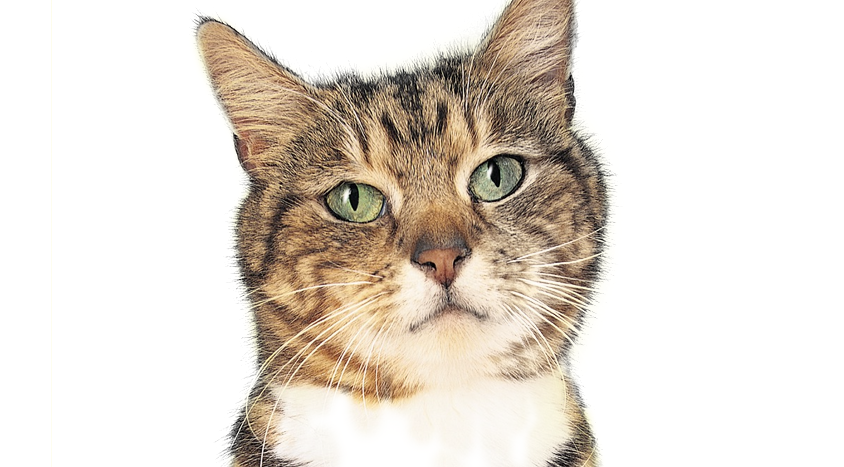Hyperthyroidism
Hyperthyroidism is caused by a tumor in one or both thyroid glands. The tumor causes too much thyroid hormone to be released into the body. This typically causes weight loss, increased appetite, and behavioral changes. Some cats become more irritable, and are more easily stressed than usual. They may develop litter box problems because they fear other cats, dogs, or humans in the house and avoid coming out from hiding places to use the litter box when others are around. Small changes in the litter box, type of litter, cleanliness of the box, etc. can be very upsetting to these already stressed cats resulting in marking or voiding in undesirable locations.
Hyperthyroid cats may also produce large volumes of urine similar to cats with kidney disease and diabetes and have volume overload problems. Finally, they may become weak from heart failure or low potassium levels and may be unable to reach the litter box easily. Hyperthyroidism is one of the few curable problems of aged cats. It can be cured with radioactive iodine treatment or surgery, or controlled with medication. Litter box issues often improve significantly with treatment.

Diabetes
Diabetes is common in older cats, especially overweight cats on high carbohydrate diets. The increased blood sugar levels have a multitude of effects on the cat. The increased sugar in the blood spills into the urine and draws additional water along with it, thus increasing urine volume. The sugar in the urine provides a great source of food for bacteria in the urine, thus promoting urinary tract infections. In addition, the high blood sugar levels have a toxic effect on the nerves (diabetic polyneuropathy). This nerve damage then causes muscle weakness, which makes it difficult to get around especially navigating stairs, and can thus contribute to litter box indiscretions.
Treating the diabetes with insulin and special diabetic diets can control these symptoms and often eliminate them completely. Antibiotics can eradicate the urinary tract infections, and the neuropathy usually improves as the blood sugar levels improve.
Dementia
Cognitive function disorders in elderly cats can occur just as it does in humans. Although a true "kitty Alzheimer" disorder is not currently recognized, other types of dementia from vascular disease, hypertension, cancer, parasite migration, and certain viral and bacterial infections are seen. Some cats will avoid the litter box completely, while others may occasionally get lost in the house and are unable to find the litter box. Controlling the cause of the dementia where possible is ideal. Often, confining the cat to a smaller area such as a spare bedroom can be helpful as they are less likely to become disoriented. Some cats may benefit from cognitive dysfunction medication or antianxiety medication.


Chronic Kidney Disease
Chronic kidney disease is the most common metabolic disease of older cats. Cats evolved in the desert, and their kidneys are designed to conserve water by eliminating wastes in a small volume of concentrated urine. When the kidneys age, they gradually lose the ability to concentrate urine, and consequently need more water to remove the same amount of waste products. Eventually, the kidneys are unable to remove the waste products completely, and these waste products build up in the blood. These elevated waste products cause loss of appetite, nausea, vomiting and weight loss. Many cats with kidney disease become dehydrated because of the large amount of dilute urine they are producing. They simply cannot drink enough water to make up for what they lose in the urine.
Often constipation occurs due to dehydration and decreased appetite. Some cats with kidney disease cannot fully empty their bladder due to loss of muscle tone from stretching of the bladder, and can dribble urine. Others just cannot make it to the litter box in time, similar to a toddler without good bladder control. Weakness and debilitation in severe cases makes trips to the litter box challenging as well. Easy access to litter boxes on each level of the home and even in each side of the home can assist these debilitated cats.
Cats with kidney disease are at more risk of developing a true bacterial urinary infection. The dilute urine they produce is a good place for bacteria to grow. The immune system in these cats often is weakened, further predisposing them to infection. Severe infections can cause the kidney function to deteriorate even further. Pyelonephritis, an infection of the kidney tissues, can develop and can cause death if left untreated. Some infections may be clinically inapparent, and require culture to detect.
Kidney stones can harbor bacteria and be the cause of chronic or recurrent infections. These stones can migrate and obstruct the ureter. This is extremely painful and can cause urination outside of the box. When the obstruction is complete, it can cause hydronephrosis. With hydronephrosis, urine is unable to pass down the ureter and backs up into the kidney. The kidney responds by stretching as much as possible. Eventually the normal structure of the kidney is lost and thus it is unable to perform its tasks of filtering the blood. Sometimes the ureteral stone can be pushed through medically or removed with microsurgery. If that is not possible, the kidney needs to be surgically removed.
Kidney disease is treated with dietary changes, nutritional supplements, fluid therapy, and other medications. By controlling and improving the kidney disease, the cat feels better, is stronger and more able to make it to the litter box, and has better muscle tone to void more completely and have better sphincter control.
Keeping the litter boxes clean is essential. Cats with kidney disease saturate the litter quickly since they are urinating large volumes of urine. Scoop the litter box 1-2 times a day to keep the box clean and the litter attractive to your cat.
